In 1869 the Nuwara Eliya Golf Club and golf course was established.
When the British came to the island Nuwara Eliya was apparently a “wild open plain” with few inhabitants and no commerce or industry in the region. In 1818 after the British annexed the Kandyan Kingdom to the empire, Dr. John Davy, brother of Sir Humphrey Davy the famous chemist while he was on a hunting party ‘discovered’ Nuwara Eliya and it was later developed in 1828 into a health resort and sanatorium by Sir Edward Barnes the Governor of the island at the time. Sir Barnes also built a mansion ‘Barnes Hall” for himself, and today after several extensions stands as the Grand Hotel Nuwara Eliya. However, the town itself did not extend beyond few amenities for the military with a few residential and other buildings.
In 1847 Sir Samuel Baker, a British explorer established a settlement in Nuwara Eliya and realizing its similarity to British summer climate, imported all the appurtenances of an English country town and Nuwara Eliya began to take shape as a British hamlet. The planting and development of tea plantations in the Nuwara Eliya regions brought trappings of the commercial world in the second half of the 19th Century transforming Nuwara Eliya from an open plain of wilderness to a British town and holiday resort. Its cool invigorating climate made it attractive to the British personnel from commerce and administration and later on by the Ceylonese to enjoy holidays in April when the sun is hottest in Colombo. That saw the building of more residences (copying “Old English” architecture styles) and the introduction of British sports and recreations to Nuwara Eliya such as golf, tennis, horse racing, cricket, croquet, hunting and trout fishing.
Nuwara Eliya is a town nestled in a valley at an elevation of 6,230 feet above sea level in the central hills of the island and is the heart of Ceylon Tea industry. On its north east border rises Pidurutalagala, the islands highest point of elevation at 8,281 feet above sea level and its climate varies from 12-22 C daytime temperatures through the year amazing a visitor that within 4 hours drive (approx. 180 km) can be experienced the climate change from the hot coastal plains of Colombo to the cool crisp climes that require change of attire from cottons to woollens and exchanging air-conditioned rooms for those with heaters or log fires.
The approach to Nuwara Eliya is beautiful and spectacular on a sunny day. Driving up winding roads through green carpets of tea clad mountain slopes and flowers, cascading waterfalls and mountain streams.
